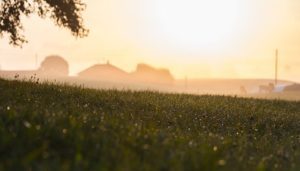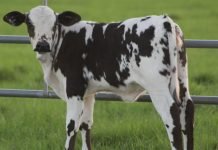 I spent years trading hamburgers for veggie patties, a “morally-conscious” food consumer who sought organic, natural ingredients whenever possible. Growing up in the city, I didn’t really understand how our food was grown. That is, until I left and started raising cattle myself.
I spent years trading hamburgers for veggie patties, a “morally-conscious” food consumer who sought organic, natural ingredients whenever possible. Growing up in the city, I didn’t really understand how our food was grown. That is, until I left and started raising cattle myself.
Eventually, I began to crave hot dogs at ball games and turkey on Thanksgiving and gave up being a vegetarian, but I still tried to eat as organic and naturally as possible. After my husband and I had our first daughter, we decided to move to rural Kansas and join his family’s farm, a conventionally raised cattle ranch. After the move, I struggled to find the same variety of foods and often drove to nearby cities to shop at specialty stores and bring home coolers full of organic produce and natural meats.
Farmers, they are just like us.
As I began to meet farmers, I saw people who truly care about the food they feed their own families and the rest of the world. I questioned my own farm’s practices, too, and became convinced we’re doing the best we can for our animals, our land and our food supply, like most farm families today.
I no longer fear growth implants, GMO foods or cattle that receive an antibiotic if they become sick. All of these technologies serve a purpose, and I believe the farmers who use them do so after thoughtful consideration and for reasons I never understood as an urban consumer.
For example, I used to question growth implants for cattle. Since joining the farm, I’ve learned how these hormones improve sustainability by producing more pounds of food for the same amount of resources. On our farm, an implant also replaces hormones lost when a bull is castrated to fulfill the body’s need for hormones to thrive. Everything we do to our cattle helps keep them healthy and grow to their fullest potential.
My former self was very concerned with excess hormones in food. Now, I understand that almost all the food we eat naturally contains some hormones because plants and animals need those hormones to grow. The implants we give our cattle don’t create an excess and are long gone before the meat is on a plate. In addition to being administered by the watchful eye of multi-generation producers like my family, the U.S. Food & Drug Administration also approves the safety of growth implants.
Kindergarten for calves
I once questioned whether conventionally-raised cattle were well cared for during their lives. Our business is what we like to call a “kindergarten” for calves. We take weaned calves and acclimate them to living on grass. We have a stringent vaccination program that helps keep animals healthy. The cattle have a doctor on call, our local veterinarian, in case of illness.
One of our biggest challenges is the change in weather. Kansas is known for its temperature swings. Some days can feel like winter overnight and summer during the day. To help prevent sickness, we check on calves more frequently during these times. We are out every year breaking ice for water in the winter and planting more trees each spring for shade.
We understand that fresh, clean water is critical to animal health. That’s why we actively improve our water systems and ponds with new technology, ensuring our cattle can drink fresh water on demand while protecting the natural environment of our ponds and streams. We’ve even installed gravity pipes to fill waterers so we don’t have to use more water than necessary. It’s a conservation win combined with good cattle handling.
Purchasing power
Today, I’m still the family’s main grocery shopper, but I’m happy to serve cheeseburgers with affordable, safe ground beef from the grocery store. When I buy food, I’m more likely to seek products with a “made in the U.S.A.” label over the “organic” label, which can have different standards across the world.
Just like any other business, we want our family farm to grow and thrive. As ranchers, we have the added responsibility of producing a safe and healthy product for our family — and yours. I spent years worrying over the quality of my food. Now, I know farmers everywhere are already sweating those details for you.
 About the author: Frances and her husband, Kris, raise beef cattle — and their three daughters — in Bartlett, Kansas. She is a volunteer for CommonGround, a national organization of women farmers and ranchers who share stories from their family farms and answer your questions about farming and food. Visit FindOurCommonGround.com to learn more.
About the author: Frances and her husband, Kris, raise beef cattle — and their three daughters — in Bartlett, Kansas. She is a volunteer for CommonGround, a national organization of women farmers and ranchers who share stories from their family farms and answer your questions about farming and food. Visit FindOurCommonGround.com to learn more.

















Thanks for sharing this. Like your former self, I know basically nothing about farming and ranching. I am glad to hear there’s something I can worry a little less about!
So glad we could ease some of your worries! Don’t hesitate to reach out to any of our farmer volunteers when you have questions about how we raise food. We love sharing our farms with others!